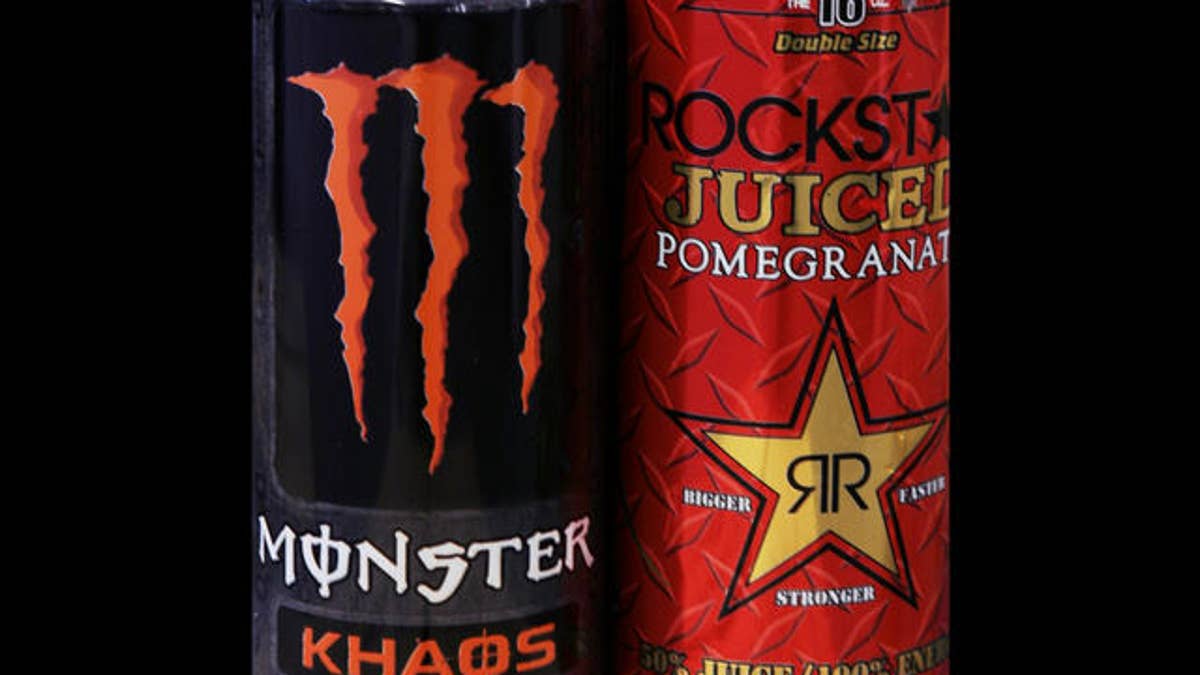
(AP)
The company Monster Beverage is fighting back against a lawsuit alleging their widely popular energy drink was responsible for the death of a 14-year-old girl.
According to Monster, no blood test was performed to confirm that the Maryland resident Anais Fournier died of "caffeine toxicity."
The company’s disclosure comes amid intensifying scrutiny of energy drinks and their caffeine levels.
Last year the family of Fournier filed the lawsuit in which they said the girl went into cardiac arrest after drinking two, 24-ounce cans of Monster drinks in a 24-hour period. The Food and Drug Administration has also said it is investigating reports of deaths linked to energy drinks, including five that cite Monster beverages. The agency notes that the reports don't prove the drinks caused the deaths.
In an interview, Monster's lawyer Daniel Callahan said the company hired a team of physicians to review the medical records in the case, which he said suggest Fournier died of natural causes brought on by her pre-existing heart conditions. The team found no medical evidence for an autopsy report that said "caffeine toxicity" was a factor, he said.
Callahan said that declaration on the autopsy report was made based on interviews with Anais Fournier's mother, who told the medical examiner's office the girl had consumed energy drinks before her death.
A spokesman for Maryland's chief medical examiner could not immediately confirm whether a blood test had been performed to check for caffeine levels and said that the office does not comment on cases in litigation. The cause of death listed on the autopsy report was "cardiac arrhythmia due to caffeine toxicity complicating mitral valve regurgitation in the setting of Ehler's-Danlos syndrome," which is a heart condition.
Kevin Goldberg, a Maryland attorney for Fournier's family, said that the absence of a test for caffeine "doesn't tell us anything" and that the family is looking forward to a jury determining Monster's accountability.
"In America, a jury of our peers determines justice. Not doctors paid by billion-dollar corporations to attend press conferences," he wrote.
Labeling on Monster's cans say the drinks are not for children or pregnant women. But Goldberg said the reference to children is "ambiguous and intentionally misleading" because Monster's marketing is geared toward teenagers and young adults. Monster says its target market is 18 to 34 years old but that its drinks are nevertheless safe for children as well.
The company also said that evidence obtained as part of the lawsuit's discovery process shows Anais Fournier regularly had energy drinks and frequented Starbucks without incident. Monster made the findings public during a press conference in Chicago, which is holding a hearing on a ban on energy drinks Tuesday.
Callahan also noted that none of the other incidents the FDA is investigating has resulted in a lawsuit against Monster.
Before the spate of bad publicity that dragged down its stock price in recent months, Monster had been enjoying enormous growth because of the surging popularity of energy drinks. In 2011, sales volume for energy drink overall rose 17 percent, according to the industry tracker Beverage Digest, with the three biggest players — Monster, Red Bull and Rockstar — all logging double-digit gains.
But the success has also brought greater scrutiny. This summer, the New York state attorney general's office subpoenaed Monster as part of an investigation into how energy drinks are made and marketed. Subpoenas were also sent to Living Essentials, which makes 5-Hour Energy shots, and PepsiCo Inc., which makes AMP.
Lawmakers have also called on the FDA to investigate the use of ingredients such as taurine in energy drinks and whether the caffeine levels are safe for children.
Monster has stood by the safety of its drinks, which it says contain 240 milligrams of caffeine for a 24-ounce can, compared with 330 milligrams in a 16-ounce cup of Starbucks coffee. Monster, based in Corona, Calif., has recently said it will begin disclosing the caffeine levels in its drink labels.
Based on reporting by the Associated Press.
Follow us on twitter.com/foxnewslatino
Like us at facebook.com/foxnewslatino








































